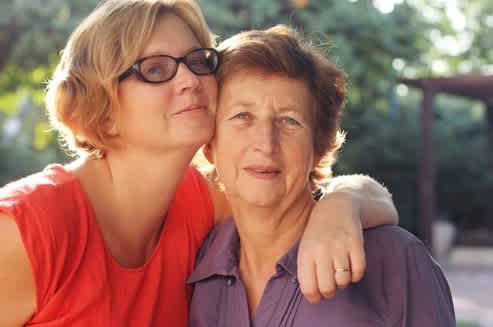Guilt and Forgiveness on Mother's Day

Not everyone will feel like celebrating this Mother’s Day. For anyone who has lost a mother, Mother’s Day can be a painful time. For many caregivers, their mother is there, but also lost. Diseases like dementia and Alzheimer’s steal the ones we love before they are gone, and often reverse the parent-child role.
Many people have complex relationships with their mothers, but when you are a child and a caregiver, you deal with a new level of complexity. Caregiving can prompt natural feelings of resentment as children cope with the responsibility of caring for their mother, the person who cared so well for us throughout our lives. These feelings of resentment usually lead to guilt.
Caregiver Guilt
Caregiver guilt is as common as it is destructive. By not addressing it in a healthy and constructive manner you put your own well-being in jeopardy, and risk hurting your friends and family.
Caregivers often experience overwhelming feelings of guilt for past mistakes, for neglecting their own spouse and children, for not being able to do more, or for resenting their role as a caregiver (even when these feelings are fleeting).
On Mother’s Day, such feelings are often magnified, but you can overcome them. Every mother wants health and happiness for her children. As a caregiver, the only way to realize health and happiness is to overcome your guilt and forgive yourself.
Forgiveness
Forgiving yourself is not always easy, but it is important. Forgiveness will allow you to live your own life, and be a better caregiver without caregiver burnout issues.
You may also need to forgive your mother. If you’re caring for a parent with dementia, Alzheimer’s disease or a mental health illness then you may be the target of verbal (or physical) abuse. It is difficult to empathize with someone who has dementia, Alzheimer’s or a mental illness, but it is not impossible. Remember that forgiving someone does not mean condoning their behaviour. Forgiveness is about you living your life, without the weight of the past holding you back.
In many cases caregivers feel guilty because of their own unresolved feelings of resentment towards the person they are caring for, and the only way to overcome this is through empathy and forgiveness. Keep in mind that the person’s actions are the result of their illness. While this does not justify their actions, it will help you to empathize with them. Doing so will help you forgive, and grow.
It is often therapeutic (though not always easy) to confront someone directly about their past actions, but many caregivers do not have this luxury. If your mother is suffering from dementia, Alzheimer’s, or other illnesses causing neurological issues then she lacks the capacity to understand her behaviour, or the impact it has on you. Being able to forgive and care for her effectively is entirely dependent on you.
Mother’s Day Gift
You may not have many reasons to celebrate this Mother’s Day, but you do have an opportunity to grow. Instead of suppressing or falling victim to your own guilt, resentment, or grief, confront it head on. Use the courage and strength that you have within you to forgive yourself, and your mother through empathy. Do it because every mother wants the best for their child, and more importantly do it for yourself, because you deserve freedom from the resentment and guilt that is holding you back.